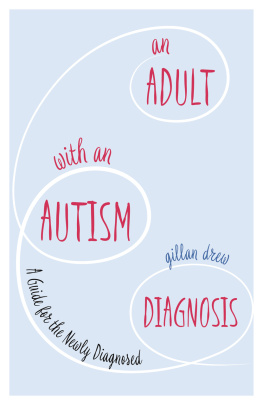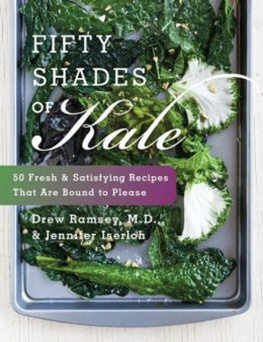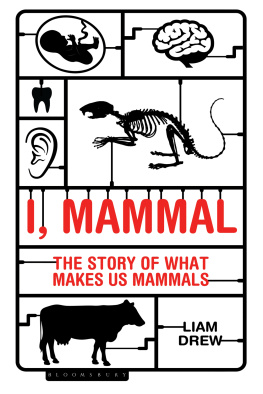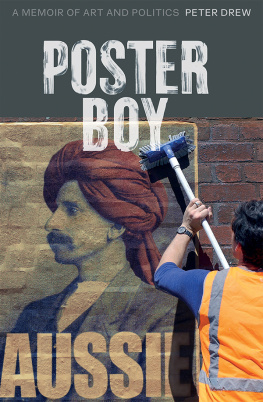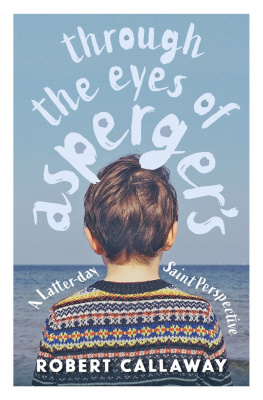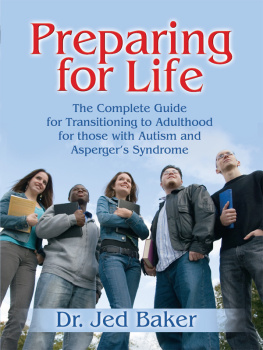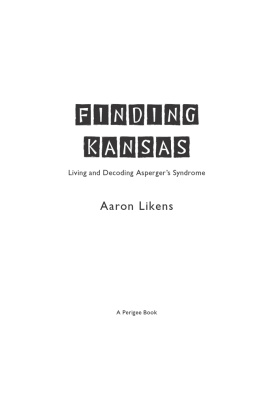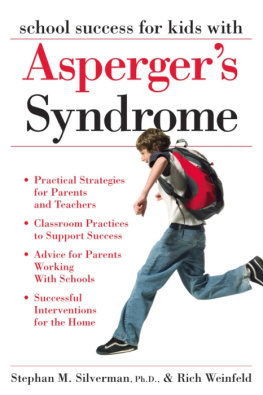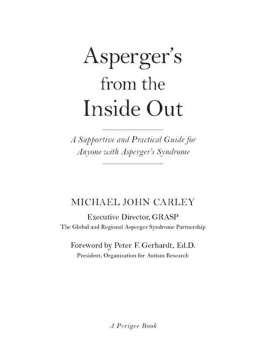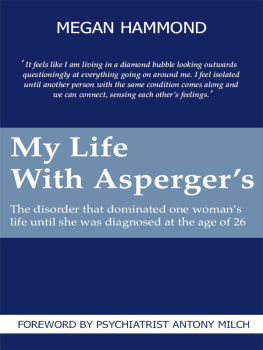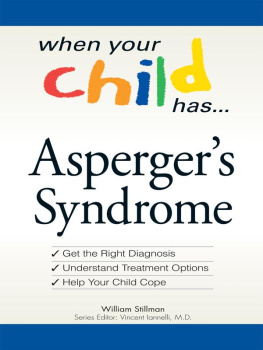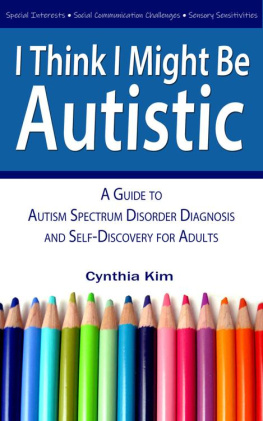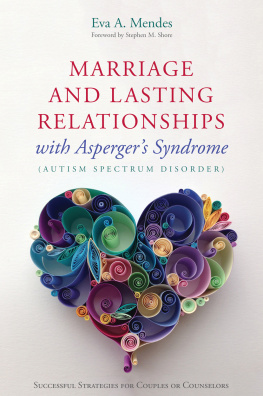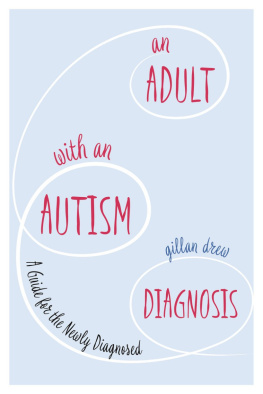
As intended, this book gives a good first-hand account about life before and after diagnosis. This would be useful to people with autism, parents, partners, friends and employers. Positive, funny and insightful, it is a reminder that living with autism takes courage, hard work, encouragement and understanding from those with a diagnosis and society in general.
Karen Wilmshurst, Advocacy Services Manager, Autism Wessex
As a support worker for people on the autism spectrum, I found this book a very helpful guide. It has helped me to be much more aware of the things people with Aspergers can struggle with. I can highly recommend it to anyone who knows somebody with Aspergers as well as to people on the spectrum who just received their diagnosis.
Karin Meineke, Support Worker, Autism Wessex
of related interest
The Complete Guide to Aspergers Syndrome
Tony Attwood
ISBN 978 1 84310 669 2
eISBN 978 1 84642 559 2
Sex, Drugs and Aspergers Syndrome (ASD)
A User Guide to Adulthood
Luke Jackson
Foreword by Tony Attwood
ISBN 978 1 78592 196 4
eISBN 978 1 78450 139 6
Love, Partnership, or Singleton on the Autism Spectrum
Edited by Luke Beardon and Dean Worton
ISBN 978 1 78592 206 0
eISBN 978 1 78450 484 7
AN ADULT
WITH AN
AUTISM
DIAGNOSIS
A Guide for the Newly Diagnosed
Gillan Drew

Jessica Kingsley Publishers
London and Philadelphia
First published in 2017
by Jessica Kingsley Publishers
73 Collier Street
London N1 9BE, UK
and
400 Market Street, Suite 400
Philadelphia, PA 19106, USA
www.jkp.com
Copyright Gillan Drew 2017
All rights reserved. No part of this publication may be reproduced in any material form (including photocopying, storing in any medium by electronic means or transmitting) without the written permission of the copyright owner except in accordance with the provisions of the law or under terms of a licence issued in the UK by the Copyright Licensing Agency Ltd. www.cla.co.uk or in overseas territories by the relevant reproduction rights organisation, for details see www.ifrro.org. Applications for the copyright owners written permission to reproduce any part of this publication should be addressed to the publisher.
Warning: The doing of an unauthorised act in relation to a copyright work may result in both a civil claim for damages and criminal prosecution.
Library of Congress Cataloging in Publication Data
Title: An adult with an autism diagnosis : a guide for the newly diagnosed / Gillan Drew.
Description: London ; Philadelphia : Jessica Kingsley Publishers, 2017.
Identifiers: LCCN 2016043062 (print) | LCCN 2016047828 (ebook) | ISBN 9781785922466 (alk. paper) | ISBN 9781784505301 ()
Subjects: LCSH: Autism spectrum disorders--Popular works.
Classification: LCC RC553.A88 D74 2017 (print) | LCC RC553.A88 (ebook) | DDC 616.85/882--dc23
British Library Cataloguing in Publication Data
A CIP catalogue record for this book is available from the British Library
ISBN 978 1 78592 246 6
eISBN 978 1 78450 530 1
To Daisy
CONTENTS
ACKNOWLEDGEMENTS
I would like to thank Rachel Dormer for supporting me after my diagnosis and introducing me to my wife you helped me become the man I am today. Thanks also to my support worker Karen Jeans for encouraging me to write this book and never giving up on me. I would never have made it this far in life without my parents, who supported me through thick and thin, before, during and after my diagnosis I appreciate everything you have done for me. And finally, a massive thank you to my wife and daughter: you are my inspiration and the reason I get out of bed each morning.
Introduction
When I was diagnosed with Aspergers Syndrome, an Autism Spectrum Disorder, at the age of 28, I was sent away without so much as a leaflet to explain what it all meant. As you can imagine, I was left with more questions than answers. What exactly is autism? Why do I have it? How can it be treated? What does it mean for my life? How does it affect work? How does it affect relationships? What are the long-term consequences? Can I still get married and have children? Should I get professional support? Where should I live? How do I explain this to people? Why was I not diagnosed as a child? Will things improve?
Unfortunately, there was nobody I could ask and nobody who could answer. As someone whose only knowledge of autism came from the movie Rain Man , I discovered to my dismay that there were no books catering for the newly diagnosed adult. The vast majority of the literature on autism focuses on children with the condition, and those books that do cover adults assume you either received the diagnosis as a child and therefore understand an awful lot about it already, or are qualified as a clinical psychologist. I craved a book that could help me understand what it means to be diagnosed with autism as an adult.
Failing to find it, I decided to write it myself to help others come to terms with this life-changing news.
The journey to diagnosis and beyond
The journey to the diagnosis can be a long and arduous one. Before I discovered I had autism, my life was both challenging and chaotic. I bounced from job to job and place to place, trying and failing to make things work. I struggled to make friends or fit in, and on the rare occasions when I had relationships with others they were turbulent and unhealthy. My whole life I felt that I was different from other people, but wasnt able to explain why. I was bullied and ostracized, last picked at sports and never invited to parties. I was lonely and depressed, self-harmed and had several breakdowns. I was unable to function in a world in which I didnt seem to belong.
The psychological community misdiagnosed me several times, put me on various different antidepressants and mood stabilizers, and sent me for all manner of psychological therapies and interventions. None of it made sense until one day my mother watched a programme about a boy with Aspergers who seemed in every way identical to how I had been as a child. The more she researched Aspergers Syndrome, the more she realized I fulfilled all the diagnostic criteria. The psychiatrists were reluctant to send me to the Aspergers specialist as they were adamant I did not have it. When they eventually agreed, the specialist told me within minutes that I was absolutely on the autism spectrum.
I therefore know what its like to live most of your life struggling to fit into society, passed from pillar to post by the mental health community, aware that something is wrong but unable to figure out what it is. I also know what it feels like to receive a diagnosis of autism later in life and the problems you might have adjusting to or accepting that diagnosis. Alongside the relief that you now have a reason for your troubles, it is common to feel a mixture of anger, sadness, fear and shame. I felt very lost and alone, miserable about the present and pessimistic about the prospects for the future, but let me reassure you that being diagnosed with autism does not make you any less of a person and does not prevent you from achieving a place in this world.
The diagnosis is an opportunity to take stock of your life, learn about yourself, and move forward with a new-found awareness of your capabilities. Looking back over my life, I have been able to work out why I did certain things and why certain situations didnt work, and it has helped me explain and come to accept the good and bad things that have come from living with the condition. Some people with autism see it as an illness, a disease, the bane of their lives, and wish they could be without it; others embrace it, and acknowledge that it is a part of them. All I know is that I would not be who I am without it.
Next page
